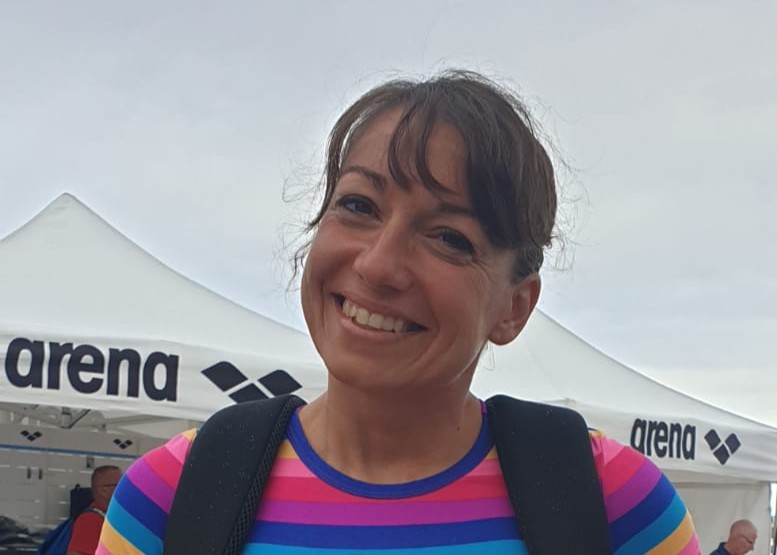Ben Lane spoke with Italian open water swimming Elena Edatti
For Italian swimmer and psychologist Elena Edatti, open water is more than a training ground: it’s where she thinks clearly, resets, and finds perspective. At thirty-nine, she balances her professional life with a love of endurance swimming that has taken her from Ibiza to Ischia, from the Ebro River to lakes across Central Europe.
Her story shows how swimming can be both a physical test and a form of therapy, a steady conversation between body and mind.
Beginnings and Balance
Elena has swum for most of her life. As a child, pool sessions taught her structure and patience. Later, she competed as a runner before returning fully to the water — the environment that felt most natural.
Swimming has been the constant thread through her years. In winter, she trains indoors with a masters team; in summer, she moves outdoors, drawn to the quiet rhythm of open water.
For her, each race is more than competition. It’s a mix of training, travel, and reflection, a way to meet people who share the same love for long distances and to experience new landscapes from the water’s edge.
Six Journeys, Six Lessons
The 2025 season was one of her busiest yet, with six major races, each with its own challenge.
It began with the Ibiza–Formentera 30 km crossing, a long stretch of open sea between two islands. Strong currents and no visual markers made it as much a mental test as a physical one.
“You’re surrounded by nothing but blue,” she says. “It forces you to trust your training.”
Then came Lipno, a 33 km lake swim in the Czech Republic, flat and calm but surrounded by mountains that mirrored perfectly on the surface.
“It’s like swimming through a reflection,” she says.
The UltraEbre Swim Marathon in Spain — 30.8 km along the Ebro River — was one of her highlights.
“It’s well organised and full of energy,” she says. “You feel part of a real swimming community.”
The Lisboa–Cascais 20 km race followed — a demanding route that begins in the calm Tagus River and ends in the open Atlantic, where waves and temperature shifts require constant adjustment.
In Greece, the 26 km Gulf of Toroneos swim tested her endurance in high heat and warm water.
And finally, she completed the Swim Around Ischia, a 30 km loop of the Italian island surrounded by cliffs and fishing villages.
“It’s hard, but the scenery makes every stroke worth it.”
Each event left her with something different: lessons in focus, adaptability, patience, and resilience.
Focus Through Movement
Open water gives Elena what the pool never could: quiet. When she swims, everything narrows to movement, breath, and rhythm. The repetition becomes grounding, a mental reset that helps her manage stress and find perspective.
As a psychologist, she understands how closely physical activity connects with emotional well-being.
“For me, swimming is mindfulness in motion,” she says. “It’s the one time I feel completely present.”
Training the Body and the Mind
Behind her calm approach is consistent work. Elena trains daily, alternating endurance sessions with speed work. In the gym, she focuses on strength and stability, especially shoulders, core, and legs. Nutrition is practical: a balanced diet with carbohydrates for long swims and mineral supplements to manage fatigue.
But she believes mental preparation is just as important. Before each event, she visualises the course, the conditions, and the moment when it will get difficult.
“When that point comes, I already know how to respond,” she says.
During races, she uses small mental tools — singing a song, counting strokes, recalling parts of a book. “It keeps me focused and stops negative thoughts from taking over.”
Lessons from the Ebro
Among all her races, the UltraEbre stands out. The river is unpredictable, sometimes helping, sometimes pushing back. The landscape shifts constantly, from quiet reeds to wide bridges and open sky.
“It’s a race that teaches respect,” Elena says. “You learn to listen to the water, manage your energy, and stay patient. If you fight it, you lose.”
In the best moments, everything aligns: movement, breathing, and flow. “Those are the times when swimming feels effortless.”
When It Hurts
Elena knows that pain and fatigue are part of every long swim. “There’s no one to beat but your own doubts,” she says.
When it gets hard, she reminds herself of the work she’s done to get there, the early mornings and the hours in cold water. Sometimes she repeats short mantras; sometimes she thinks of the people waiting at the finish.
“It’s about proving to yourself that you can keep going.”
Final Reflections
For Elena, swimming is built on a balance between the physical and the mental.
“You can train your muscles,” she says, “but if your mind gives up, the body follows. And if your mind stays calm, your body will keep moving.”
That harmony — body following mind, mind guided by focus — is what she calls her best stroke.
For Elena Edatti, swimming is less about medals and more about mindset. Her races across Europe are not just distances completed, but lessons in focus, patience, and awareness. Through every challenge — calm lakes, strong currents, heat, or fatigue — she finds the same truth: swimming brings her back to balance.
In that steady rhythm between effort and calm, she finds focus and, stroke by stroke, a sense of peace.

